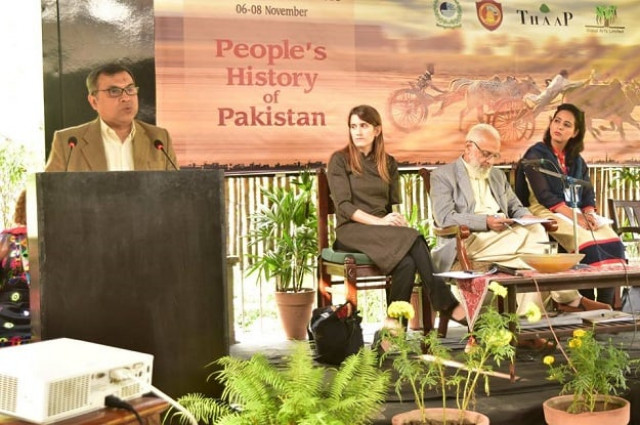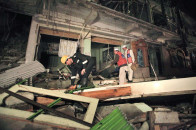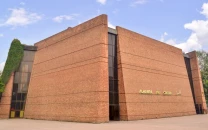THAAP conference: ‘Security part of Karachi’s spatial imagination’
Researcher says local govts should be administratively potent

Prof. Dr. Noman Ahmed presenting his research paper. PHOTO: fb.com/Thaap
“Over the years, Karachi has undergone spatial changes that have fed violence in the metropolitan. Security mechanisms have become a part of public imagination.”
NED University of Engineering and Technology Department of Architecture and Planning Chairman Nauman Ahmed said this in his presentation at the Sixth International THAAP Conference on Sunday.

His research paper was titled The Story of Contestation of Space in Karachi in the Backdrop of Safety and Security Issues.
Ahmed said he had started his research in 2012 in collaboration with the International Institute for Environment and Development. A part of the project concluded this year.
Ahmed argued that given Karachi’s metropolitan nature, the city could absorb people with diverse backgrounds. Karachi, he said, had witnessed spatial changes due to violence which had grown over the years.
“Violence in the city prompted the operation by Rangers,” he said. “But violence has various dimensions. Ethno-religious and political tensions reflect one aspect of violence in Karachi,” he said.
Ahmed said there was hope for local governments. It was imperative, he said, to ensure that they were administratively potent.
Ahmed said, earlier violence was restricted to the city’s peripheral areas.
“That is no longer the case. Violence is no longer confined to peripheries. It has made in-roads into informal and formal settlements.”
He said space had also been affected by the violence experienced by the citizens of the city.
“The experience varies in various localities on account of the varying types of violence,” he said.
He said various security mechanisms had emerged, including barriers, gated neighbourhoods and cargo containers.
“Despite a Rangers’ operation, during which privately controlled barriers were removed, barriers continue to resurface,” he said.
“Gated neighbourhoods allow entry to specific people and affect social dynamics of a city,” he said.
Citing the case of push-cart vendors, who usually make their way into localities of middle-income households, he said they had been denied entry due to the security situation.
“These divisions criminalise and demonise the poor,” he said.
German architect and urban planner Helena Cermeno Mediavilla delved into the historical past of the city in her paper titled Lahore’s Cityscapes: Reimagining the Urban Past and Present Imageabilities of the City.
The paper was part of her doctoral research.
It explored the colonial heritage of Lahore. “In order to explore cityscapes, it is vital to understand social practices in the city,” she said.
She cited interviews from her paper discussing the perception of interviewees of various parts of the city as well as the impact of development projects on their lives.
She said she had observed disruptive attachments and a diminished sense of belonging from her interviewees.
Later, responding to a query relating to impact of social inequalities in city spaces, she said the gulf was widening so much so that there was no more an “in-between space for the middle-class.”
The presentation on the paper titled The Isolated Communities of South Asia: An Outcome of the Political Mapping from Indian Subcontinent focused on refugee camps.
The researcher had chosen the Geneva Camp in Bangladesh, the Hindu Camp in Lahore and the Pak-Hindu Camp in Delhi for the paper.
The paper was authored by architects Tanzia Islam, Shajabin Kabir and Mehreen Mustafa.
Mustafa presented the paper and focused on the Hindu Camp in Lahore.
“Lahore became home to a large number of refugees following the Partition. But there was no coherent policy for their rehabilitation in the long run,” she said.
She said the Hindu Camp, a temporary abode for fleeing Hindu and Sikh migrants, was later used for Muslims migrating to Pakistan.
“The camp now houses a third generation of refugees,” she said.
“It is a manifestation of segregation of isolated communities,” she said.
“Segregated communities should not be sidelined. They should be integrated and rehabilitated with responsibility,” she added.
Published in The Express Tribune, November 8th, 2015.



















COMMENTS
Comments are moderated and generally will be posted if they are on-topic and not abusive.
For more information, please see our Comments FAQ